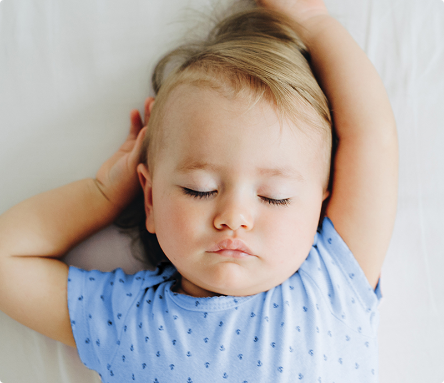
- Chronotype
- Sleep duration
- Sleep efficiency
- Sleep latency
SneakPeek At-Home Early – Sleep DNA Test
Learn how to give your child the gift of nourishing, restorative sleep every night with Traits Sleep. Traits Sleep is a DNA test that illuminates your child’s genetic predisposition to certain sleep behaviors. Our easy-to-use oral DNA testing kit will help you discover your child’s required sleep duration, average sleep efficiency, sleep latency and sleep chronotype as predicted by genetics.
Each report you receive after genetic testing will provide a closer look at your child’s genetic information regarding his sleep behaviors as well as custom tips and tricks to help you ensure the best possible sleep quality for your child.

- Chronotype
- Sleep duration
- Sleep efficiency
- Sleep latency
What Predictions Can the SneakPeek Sleep DNA Test Reveal?
Moms and Dads know better than most how big a difference a good night’s sleep can make in their child’s health and wellbeing. Sleep behavior can determine one’s mood, concentration, and wakefulness throughout the day. With a few hints from SneakPeek, you can create healthy habits built around your child’s individual genetic data and sleep profile. Traits DNA data will help you understand the following sleep tendencies of your child:
- Sleep Latency – The moments between when your child closes her eyes and falls asleep is called sleep latency (a.k.a. the counting sheep stage of slumber). Understanding whether sleep onset may take more or less time than average for your child can help you optimize bedtime and wake-up routines to create a more beneficial sleep schedule that helps foster your child’s sleep quality. When you know how long your child takes to fall asleep, you can ensure she’s getting the rest her mind and body need.
- Sleep Efficiency – The time actually spent asleep over the time spent trying to sleep is called sleep efficiency. Sleep efficiency changes based on a child’s age and can be impacted by genetics as well as external factors like sleep environment and stress. When your child spends more time sleeping than trying to fall asleep, he can enjoy the nourishing benefits of sleep like boosted mood, increased energy levels, and strengthened memory and immune functions. Learning how to ensure your child has the most efficient sleep possible can pave the way for preventing sleep deprivation and nourishing a lifetime of healthy sleep habits.
- Sleep duration – Sleep duration is the average amount of time your child needs to sleep to feel her best every day. From a baby’s intermittent naps as she figures out her circadian rhythm (or biological clock) to a teenager’s long snoozes, your child’s sleep duration needs will change as she grows. But while some kids will need the maximum amount of sleep recommended by experts to feel their best, others may only need the minimum sleep duration to feel bright-eyed and ready for the day. Understanding how much sleep your child’s body needs as predicted by genetics can help you build an optimum sleep-wake schedule perfect for your child’s unique sleep profile.
- Sleep Chronotype – Does your little one jump out of bed long before dawn? Or can he stay up way past his bedtime playing with his toys? A sleep chronotype is a person’s natural inclination for waking up late or early—a.k.a. early birds or night owls. The SneakPeek genetic test can show your child’s genetic predisposition for being an early bird or a late one. The chronotype test will help you better understand how to create a morning and evening schedule that works with your child’s chronotype to support his mind and body health—whatever his feathers may be!

